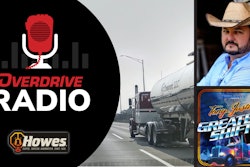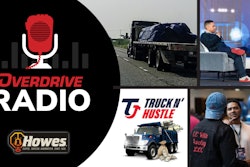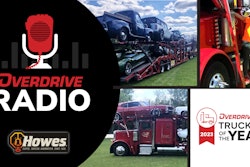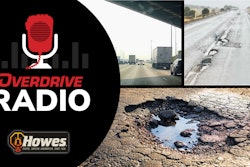Chris Dowdy counts he and his wife, Paula, and their family among the lucky ones. The subject of this edition of Overdrive Radio is one ripped right from the last month or so of a myriad headlines -- the bankruptcy and ceasing operations of Yellow. The LTL giant finally shut down after being propped up by an astounding amount of loaned money straight from the U.S. taxpayer in recent years. That followed the business generally struggling financially for many more years.
The largely union workforce there was a home for many, many people, though, and that included Dowdy for a substantial part of the last decade or so. If his name sounds familiar, longtime Overdrive readers among you may well recall his time driving for Wooten Transports with a home base in Memphis, when he spearheaded an initiative he called Truckers for Hope.
 Overdrive Radio's sponsor is Howes, longtime provider of fuel treatments like its Howes Diesel Treat anti-gel and all-weather Diesel Defender, among other products.
Overdrive Radio's sponsor is Howes, longtime provider of fuel treatments like its Howes Diesel Treat anti-gel and all-weather Diesel Defender, among other products.

As noted, though, he’s one of the lucky ones, soon to start a regional gig doing what he’s done for most of the past quarter-century -- "harassing traffic," as he puts it, joking. (Yeah, he means "driving.") Others laid off with Yellow shutting down haven’t been so lucky, though, particularly worrisome for Dowdy the prospects for dock hands and clerks and other non-CDL folks there. It's no secret now isn't exactly a wonderful time for freight and rates, as company driver job postings remained fairly low in the most recent full month, according to data compiled by the recruiting intelligence Stratas platform from Overdrive parent company Randall Reilly. .
At once, in this week's podcast, Dowdy wonders at the dozens of applications he's put in responding to company job posts. With the exception of the side move he's now making to another union driving position, he's received very little in response to those applications. Issues with prior employment verification at Yellow is one possible complication holding things up among recruiting departments, to say nothing of equipment availability as well as the generally slower freight market at the present.
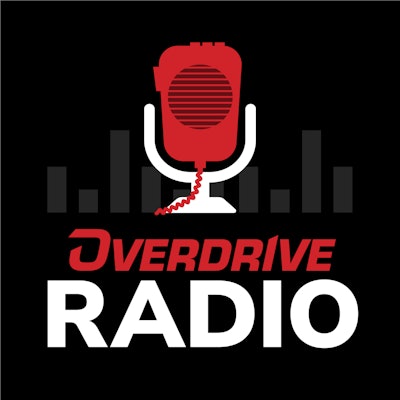 Subscribe to the podcast on your listening platform of choice for early access to the weekly Overdrive Radio series -- it drops typically every Friday to the feed and follows here at OverdriveOnline.com and in Overdrive's Youtube and Facebook feeds the following week. You can subscribe via Apple and Google podcasts, Spotify, TuneIn, most anywhere you listen.
Subscribe to the podcast on your listening platform of choice for early access to the weekly Overdrive Radio series -- it drops typically every Friday to the feed and follows here at OverdriveOnline.com and in Overdrive's Youtube and Facebook feeds the following week. You can subscribe via Apple and Google podcasts, Spotify, TuneIn, most anywhere you listen.
He also emphasizes throughout the podcast that, as with any such company implosion, though business press charts the financial missteps, ensuing lawsuits, battles over creditors and the like, what’s often lost in coverage is the toll it all takes on the individual people who are cast off to scramble for their future.
Hear Dowdy's story here:
[Related: How a Yellow bankruptcy might influence freight, used-truck markets]
Todd Dills: West Memphis, Arkansas-based trucker Chris Dowdy counts he and his wife, Paula, among the lucky ones, he says in today's edition of Overdrive Radio. Let's drive into the podcast feed Friday, August 25th, and posting at the world famous Overdriveonline.com, Monday the 28th, 2023.
I'm Todd Dills, and the subject is one ripped right from the last month or so of a myriad headlines, the bankruptcy and ceasing operations of Yellow, the LTL giant that was propped up by an astounding amount of loaned money straight from the U.S. taxpayer in recent years, and which had struggled financially for many more, you'll know if you read the business press. The largely union workforce there was a home for many, many people though, including Dowdy for a substantial part of the last decade.
If his name sounds familiar, long-time Overdrive readers among you may well recall his time driving for Wooten Transport with a home base in Memphis, where he spearheaded an initiative he called Truckers For Hope, staging visits to St. Jude's and Ronald McDonald House in Memphis with other drivers as a message of trucking goodwill for children and their families there.
Chris Dowdy: St. Jude and Ronald McDonald House, yes, sir.
Todd Dills: The Truckers For Hope effort is still in the back of his mind to restart Post-COVID, but he's had bigger fish to fry this prior month with the loss of work following Yellow's shutdown. Like I said, though, he's one of the lucky ones, soon to start a regional gig doing what he's done for most of the past quarter century.
Chris Dowdy: I'm going to be harassing traffic.
Todd Dills: Which means?
Chris Dowdy: Driving.
Todd Dills: Is it local work or is it regional?
Chris Dowdy: It's within 200 miles of the terminal or the warehouse, something like that. The farthest south we'll go, we'll go to Jackson, Mississippi, over to Little Rock. I think there is one store in Missouri, three or four in Kentucky. But anywhere in that circle over to the Tennessee River, that big of a circle is what we run.
Todd Dills: Others laid off with Yellow shutting down haven't been so lucky. And as with any such company implosion, though the business pressed charges to financial missteps and ensuing lawsuits and reorganizations and creditors and the like, what's often lost is the toll it takes on the individual people who are cast off to scramble for their own futures.
Chris Dowdy: I honestly want to get our message out. Yeah, the world sees the front of the house. The world has seen management and what's going on, but behind the scenes is a human toll.
Todd Dills: On the other side of the break we pick up with Dowdy telling the story of his past eight to nine years and so much more, including the difficulties faced by a CDL driver just trying to find a job in today's sluggish freight climate, so stay tuned.
Speaker 3: Want a squeaky clean fuel system for your diesel? Today is your lucky day. Use Howes Diesel Defender with IDX4, the strongest, most effective cleaning agent you can find in a fuel additive. Destroy the toughest carbon deposits and clean your entire fuel system in just three treatments with Howes Diesel Defender. A clean fuel system means optimal performance and increasing your fuel economy by 5% or more, guaranteed. Howes Diesel Defender, for every diesel.
Todd Dills: Find more about Diesel Defender at H-O-W-E-S, Howesproducts.com. Here is Dowdy tracking back to the last time we talked when he was still with Wooten Transports.
Chris Dowdy: I worked at Wooten, I had an opportunity come available at Yellow.
I took it, insurance was better, the pay was better, okay somewhat better, and wanted to really get into the LTL market. 20 years ago my mom was going with a third round of cancer and I wanted to be home more often. And I went to every LTL company there was. And this was before Yellow and Roadway merged together, mind you.
They all said, "When you get experience come back," "When you get experience, come back." So, how do you get experience if nobody wants to give you the opportunity?
Todd Dills: It's that old catch 22, right? A lot of people face that in all kinds of professions, no doubt.
Chris Dowdy: So true, Todd, so true.
Anyway, Yellow gave me the opportunity to get in the LTL market and I loved it. Contract in '19, I was starved out, I lost my father's house and just not working. It was work a week, off a week, work a week, off a week, and you can't pay bills like that.
Todd Dills: What was going on at the time at the company that made it that way?
Chris Dowdy: It was contract time. And it's how they dispatch no matter what. Literally if you're one person ahead of me, you been home for 11 hours, I been home for a week, they sent you out over me. But at the same time, though, it's just the way the freight ran. They were running the outside carriers or purchased transportation around us like we weren't there. And the union never stepped up and said, "Hey, sorry, you can't run purchase transportation when you have a guy sitting at home," so I left. We had our business up and rolling really good-
Todd Dills: The year was 2019 and Dowdy and his father had turned what had simply been a collecting hobby, antiques on the part of his dad, baseball cards and other things for Dowdy himself, into a full-fledged business buying and selling through an online store mostly.
Chris Dowdy: Well I went to work at Wooten in '14 and my dad was 80-something years old at the time. And he was bored and wanted something to do so I would run the computer side of things. Because it was always crazy, he did a lot with the antiques and the collectibles. The antiques and stuff like the Hall china and glassware, lamps, lanterns, all of that world. And I've been in that world for over 30 years. And it's so funny, my dad one day grabbed my iPad and he said, "I'm going to learn how to do Ebay." I was like, "Oh, crap, here we go again. Here we go. Oh, great, this ain't going to be pretty."
So he would literally go on the iPad. He would go and bid on stuff, and then when I got home or when I had a free minute he would say, "Here, you pay for it." I'm like, "Dad, I'm paying for your stuff?" "Well, no. No you're paying for it out of our money." It was like, "Dad, you're paying for it out of my money."
So in 2019 he died, things were going up. We were really growing and growing, and growing. And then we moved from his house when we got kicked out, to West Memphis. We set up shop, set up a little business separate, a little building from the house. And things were going great and then all of a sudden, what happened in January of '20? Here comes COVID. And when it happened we couldn't get any loans or anything and we were starting to struggle, not with just financial money coming in, but also getting product in, too, to resell. We were having a hard time, we were literally liquidating everything in the building.
And Paula, my wife, we're in July of '20, she's like, "Well, what are we going to do? We're running out of savings." And I said, "Well, we got to go back to work." So there again, I applied to all of these companies again and you can insert name here. And only the bottom feeders would call, none of the ones that were paying decent. I called Yellow, I said, "Hey, what's the opportunity of me coming back?" They said, "Well, here we go, you can come on back in." So I went back to work Labor Day of '20, back at Yellow.
Todd Dills: And where were you based out of when you were working for them there?
Chris Dowdy: Good old Memphis, Tennessee, home of the best barbecue in the world.
Todd Dills: And when you went back, did you go back doing the same thing you had been doing before? Were you doing line haul work then? I forget.
Chris Dowdy: Yeah, I did line haul. They wanted me to go back to line haul but I said, "Well I got two words for you. One starts with F, the other one starts with Y, you'll figure that part out." So I went to the city and the dock because being in the industry now going on 25 years, I'm ready to make that shift out of the truck. I want to get away from the truck. And that's what I had originally planned in '19 and '20 was that, "Okay, now I'm able to go do my own and press forward with being away from the truck." Because if Yellow was to go under in '19 or '20, kiss my butt, I could care less. But we were still working on trying to get Truckers For Hopes to still keep going. We went to the dock, went to the city, we went on what they call a utility run. Pretty much I left Memphis, went to Little Rock, worked the dock and come back every night. That's pretty much what I did.
And that's what they were trying to go to. The union shot it down because they didn't want line haul drivers working the dock. Granted, I give them that, nobody really wants to work the dock but somebody has to. They didn't want line haul dropping and hooking trailers. But yet you'd go to end-of-the-line terminals, say like Springdale or Shreveport, and you got to do all that yourself.
Todd Dills: It's just a matter of necessity at those locations.
Chris Dowdy: In Memphis, it's what they called an open terminal. It means we were open 24/7, 365. If, say, you came in from Nashville, you had to wait for somebody to hook your set together before you put your truck up underneath it. Or even if you were, say, from another terminal like Dallas or Chicago, wherever, you had to wait till the set was put together before you were able to get out the gate.
And Little Rock was a velocity terminal, means if somebody was there, yeah, you didn't do your own drop and hooks but when somebody wasn't there you did your own drop and hooks like Springdale, Springfield, Tulsa, the smaller terminals were all end-of-the-lines. You got to do all that yourself because the drivers also work the dock, too.
Todd Dills: You were drawn to LTL originally, it sounds like, because you wanted to be home more.
Chris Dowdy: I wanted to be home more, yes, but I wanted more money and better money because when you- When you've done over-the-road, you know how that money is, I wanted something better. I've always, in my lifetime, wanted to better myself from one to another, whether it's going from flatbed to reefer, to van or wherever. I've always wanted to better myself.
Todd Dills: Yeah, each new opportunity that you take on you want it to be better than the last.
Chris Dowdy: Right. And I also love a challenge and yes, line haul was a challenge because you had to fight the traffic going from Memphis to Dallas, or Chicago to wherever. But I could have done that in a normal, traditional over-the-road deal. So the dock was a lot more challenging to me because you're having to go, "Here is all this freight, I've got to cram it into this little bitty box, how do I make it fit?" It's like Jenga. I saw the writing on the wall when O'Brien got elected to President of the IBT, which was what? Last year I think.
Todd Dills: Elected in 2021, actually. O'Brien officially took over as Teamsters president then in 2022.
Chris Dowdy: The different information that was put out there, I kind of had a feeling that this is not Hoffa, Jr. no more. It's going to be a lot tougher and I'm like, "It's going to be hell," if you look at what he did with UPS. And he's really looking out for the workers after what UPS got and ABF. And I just knew that there was going to be something dramatic that happened. And I wanted to be prepared.
I told my wife, Paula, I said, "Listen, something major is about to go down." I told her, I said, "We're going into contract, we need to be prepared. We need to make sure that we have money saved up because either we're going to close the doors or we're going on strike." And she said, "Okay." And she puzzled, she had that deer-in-the-headlight look at first. And I finally broke it down to her and told her and she's like, "Okay."
So we put back a little bit of money. We're okay to beginning of the month. I knew Yellow had screwed up management. I knew Yellow was not in the best shape financially. And I tried to tell people this at the yards, "Be prepared for something to happen. We're going into contract time, be prepared for something to happen. Save up money, pile up money, look for something better because something is coming." And I couldn't put my finger on it.
And a lot of the guys were like, "Oh, no, you need to be drug tested." "Oh, no, that'll never happen," "Oh, no, we'll still have a job." I talked to one of them yesterday to see if he wanted to come on here and join us. And he was like, "No, but you were right, though. You sure were right, we should have listened to you."
Todd Dills: And how did you learn that you were going to be without a job and how much advance notice did you have?
Chris Dowdy: I came in that Monday night, the 31st. Yeah, because I was working an overnight shift and I came in the morning of the 25th, and I knew a lot of the yard guys. And they would see me come in and they'd always be like, "Hey, Little Rock, did you hear about this?" "Hey, Little Rock, did you hear about that?" And I'm like, "No, what?" And then I got around to the back then my shop steward stopped me. And he said, "Hey, Chris, I'm just letting you know, they're shutting down operations. Just go ahead and just file for your unpaid vacation." And I can see where he was coming from, because when you looked at the dock in Little Rock it was like nothing. It was a ghost town, it was the cleanest that I'd ever seen that dock.
So, I put two and two together, and I really wasn't feeling that great anyway. My allergies was kicking my you-know-what. So I just said, "I'll just use three days sick pay and I'll go ahead and just cash out my vacation and we'll see what happens on Monday. It couldn't be too bad." And then they called me on that Sunday night the 30th and said, "We've closed operations." And I remember when they told me I filed for my unemployment. And the next day the lady called me and she says, "Well, I can't file your unemployment because we need something hard from Yellow saying that you are officially laid off. What is your job status? Because we can't verify any information out of them, not anything." So I sat there and I says, "Well," and I looked at Paula and I said, "We're screwed."
It was that Friday they sent us the warn-notice letters, they sent that to us. And it was the following Wednesday, the lady called me up from unemployment and said, "Hey, we're going to go ahead and approve your unemployment." We've just got guys today that I saw on Facebook that just got their unemployment.
Todd Dills: We were talking on August 23rd, three-plus weeks after Dowdy was told operations were shuttered.
Chris Dowdy: And it's been a big fiasco just getting employment verified. I had a lady friend of mine here in town who manages the office here for a big nationwide temp service. And she ran mine and she says, "When we called to verify your employment the only thing they said is that you worked there, but they couldn't give us any other information than that. They didn't know when you worked there or what you did, or nothing."
So I imagine that is part of the problem as to why we can't get jobs. If you can't verify employment and the dates what else are you going to do? And it's frustrating, it's frustrating that you got to dig up phone numbers of people and say, "Here. Here, try this number here. No? Okay, try this number here. Okay, try this number here."
Todd Dills: As noted at the top, it's certainly not the greatest of times in either LTL or truckload employment markets at present, and that's probably an understatement. Dowdy can at least count himself among the lucky former Yellow drivers and other staff.
Chris Dowdy: How September is going to play out, I don't know, because we both have gotten new jobs now. I guess I'm one of the lucky ones and blessed ones because I was able to keep a Teamster job. There is not many Teamster jobs and I'm going to work for Kroger.
Todd Dills: And what are you going to be doing there, actually?
Chris Dowdy: I'm going to be harassing traffic.
Todd Dills: Which means?
Chris Dowdy: Driving.
Todd Dills: Is it local work or is it regional stuff?
Chris Dowdy: It's within 200 miles of the terminal or the warehouse or something like that. The farthest south we'll go, we'll go to Jackson, MS over to Little Rock. I think there is one store in Missouri, three or four in Kentucky. But anywhere in that circle over to the Tennessee River, that big of a circle is what we run. I really feel for the guys that were the non-CDL dock workers and the clerks and the office staff. I really do wonder about those people daily.
Because we actually had somebody kill themselves last week or so. I can't imagine having to go through being one of the clerks and trying to get a job and getting turned down every which way of Sunday. Because me, personally, I applied to hundreds of jobs and haven't heard back from any of them. Still, I'm still waiting on a bunch of them at least to respond back and say, "Hey, you don't have a job."
Todd Dills: We were talking earlier, Chris, and the advertising that comes out of trucking companies because the recruiting is what it is, it's this constant thing, it never stops. For you in this situation it's been a lot of crickets, I guess, except for this Kroger position that you're about to take.
Chris Dowdy: It's not just within the LTL market, it's everywhere.
And it's like, "Why are you say you're hiring when you're just taking applications?" Do these companies not understand that all they got to do is put their sign out and in a matter of about a week they'll have a thousand applications? Why do you need to have a pool of applications sitting there to call people up at a random notice? If I'm looking for a job I need one today, not whenever you feel like it, that's the problem.
Todd Dills: It's interesting the approach he's seen with the Kroger Company, Dowdy said, with operations there, sensing opportunity with Yellow's fault in bringing more driving positions to rely less on outside contractors to move product between distribution centers and grocery stores in the region, the opposite of what he saw amid Yellow's long struggle to stay afloat and part with the use of contract companies.
Chris Dowdy: Back in the spring the IBT sent down a memo to Yellow saying, "Hey, stop the purchase transportation," because those guys were coming in and out left and right.
Todd Dills: Generally though, he looks favorably on the work he did there.
Chris Dowdy: All in all, it was the most money that I've ever made in my career driving. It was the easiest money that I ever made driving. Kroger is going to be a side shift, money wise, from what I was making. But all in all, it's still going to be about the same. I still got the same insurance and the same pension that I think I'm one of the ones that lucked out. Because there is hardly any union jobs left. Once you take out UPS, ABS and Tforce, there is not really many left.
Todd Dills: So union or non-union, it's certain that trucking companies at the moment are taking their time with applications, Dowdy feels. Readily available equipment to put a driver in might be a problem for some. It's been an issue at Kroger, he said, in part. Yet, such a big change in operations of such a big company coming at this very moment is no doubt a strain on the untold number of individuals and their families. Dowdy, 46, and his wife, Paula, are at least on their feet, but he's certainly keeping his mind open to future possibilities.
Chris Dowdy: I may like it at Kroger and stay around until I retire or just hang around for a few years and then go from there. But the one thing that really concerns me the most is the clerks and the non-CDL people are the ones that are having it the hardest right now. A lot of them are barely making it. It's really insane what's been going on here.
And like I told you, I've been in this for 25 years. I have never seen such a fiasco as this. I honestly want to get our message out. Yeah, the world sees the front of the house. The world has seen management and what's going on, but behind the scenes is a human toll. We already got one life that I know about that is gone, it's not coming back. So how many more have got to suffer before things do fiscally turn around for a lot of these people?
Todd Dills: Here's a big thanks to Chris Dowdy for his time. With any luck we'll here from him again with his Truckers For Hope initiative in Memphis, giving back to children and their families in dire straits, the city's children's hospitals and taking a little trucking to them along the way. Find links to past stories about Dowdy in the show notes wherever you're listening.
Overdrive Radio is on Apple and Google Podcast, Soundcloud and Spotify, Podcast Static, Overcast.FM and many, many others including the world famous overdriveonline.com/overdrive-radio. Here's a big thanks for listening. Any feedback or tips for me directly, use our podcast message line at 615-852-8530, always love to hear from you.

